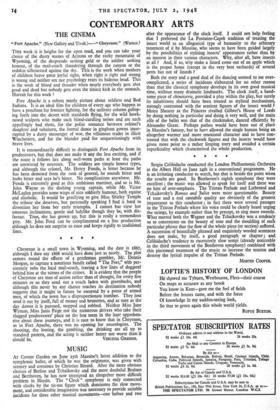CONTEMPORARY ARTS
THE CINEMA
" Fort Apache." (New Gallery and Tivoli.)—" Cheyenne." (Warner.) THIS week it is heigho for the open road, and you can take your choice of the dusty wastes of Arizona or the rocky mountains of Wyoming, of the desperado seeking gold or the soldier seeking honour, of the mail-coach thundering through the canyon or the redskin silhouetted against the sky. This is the week when mothers of children heave great joyful sighs, when right is right and wrong is wrong and neither sex nor psychology rears its hideous head. This is the week of blood and thunder when nearly everybody gets shot good and dead but nobody gets even the tiniest kick in the stomach. Hurrah for this week !
Fort Apache is a robust manly picture about soldiers and Red Indians. It is an ideal film for children of every age who happen to have a penchant for frontier fighting, for the military column gallop- ing forth into the desert with standards flying, for the wild hawk- nosed scalpers who make such blood-curdling noises and are such appallingly bad shots, for the polite romance between colonel's daughter and subaltern, the formal dance in gingham gowns inter- rupted by a dusty messenger of woe, the villainous trader in illicit Winchesters, and for the blunder paid for unquestioningly with
brave lives. •
It is extraordinarily difficult to distinguish Fort Apache from its predecessors, but that does not make it any the less exciting, and if the route it follows lies along well-worn paths at least the paths are untwisted by neuroses. The soldiers are simple honest types, and although the colonel, Mr. Henry Fonda, is bitter because he
has been demoted from the rank of general, sounds bitter and looks bitter and says he's bitter. No complications anywhere. Mr. Fonda is extremely good as this ambitious martinet, and so is Mr. John Wayne as the dashing young captain, while Mr. Victor McLaglen provides some wisps of nice soldierly humour, both equine and alcoholic. It would be gratifying to give Miss Shirley Temple the tribute she deserves, but personally speaking I find it hard to dissociate her from her early triumphs. I cannot but view her amorous inclinations, gentle and ladylike though they be, with dis- favour. True, she has grown up, but this is really a tremendous pity. Mr. John Ford can be complimented on a fine production although he does not surprise us once and keeps rigidly to traditional lines.
Cheyenne is a small town in Wyoming, and the date is 1867, although I dare say 1868 would have done just as nicely. The plot centres round the efforts of a gentleman gambler, Mr. Dennis Morgan, to capture a notorious bandit called " The Poet," whb per- sistently robs the local mail-coach, leaving a few lines of doggerel behind him at the scenes of the crimes. It is evident that the people of Cheyenne are men of action rather than of thought, for every five minutes or so they send out a coach laden with greenbacks, and although this never by any chance reaches its destination nobody suggests that it might in future be escorted by a posse of armed men, of which the town has a disproportionate number. They just send it out by itself, full of money and brunettes, and as sure as the day dawns it is pursued, stopped and robbed. Neither Miss Jane Wyman, Miss Janis Paige nor the numerous drivers who take their slugged predecessors' place on the box seem in the least apprehen- sive about these journeys, and it is nice to know that in Cheyenne, as in Fort Apache, there was no opening for neurologists. The shooting, the looting, the gambling, the drinking are all up to standard pattern, and the acting is neither better nor worse than k






































 Previous page
Previous page